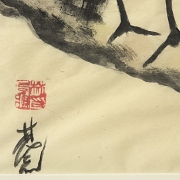Lin Fengmian (1900-1991) ‘Bird on a pine branch’, 20th century
Ink and watercolour on paper.
It shows a black bird, presumably a crow, perched with its legs outstretched on a short pine branch. The animal has an alert expression, with its wings tucked in close to its body, its head raised, its eyes wide open, and its long, sharp beak. This work by Fengmian shows a clear influence of traditional Chinese painting, which uses ink on paper as a general technique, with subtle hints of colour. The composition is simple, and the figures are formed through dynamic brushstrokes, which avoid bounded outlines as much as possible. The bird's face has an almost caricatural influence, which does not seek an anatomical and reliable study of the animal, but rather greater expressiveness.
Signed and stamped ‘林凤眠’ in the lower left corner.
Size painting: 29 x 24 cm (approx); Size with frame: 40,5 x 35,5 cm.
Attached certificate issued by Gerald Markowtz, grandson of the artist.
Provenance:
- Brazilian private collection.
- Spanish private collection (to the present day).
References:
- Christie's. Fine Chinese Modern and Contemporary Ink Paintings. Lot 1062: Lin Fengmian ‘Autum’. 22 May 2022.
- Sotheby's. Arts d'Asie. Lot 82: Lin Fengmian ‘Kingfisher’ June 15, 2023
Catalogue note:
Lin Fengmian was born in Guandong province in the year 1900, and has a childhood marked by a traumatic event, the sale of his own mother into slavery. Shortly afterwards, a fortuitous chance event changed his life completely, as his lottery ticket won; with it, he travelled to Shanghai and later to France, thus receiving a complete artistic education, which marked his personal style.
Over the years, and thanks to his constant work and undoubted talent for painting, he managed to make a name for himself on the international art scene, which was cut short during the Sino-Japanese war and the Cultural Revolution, for which he had to destroy a large part of his work and suffer a period of imprisonment. All the vicissitudes he suffered did not put an end to his passion for art, and that is why he left China in 1977 to settle with his family in Hong Kong, where his production did not cease, even attempting, on occasions, to recreate the first paintings he had to destroy. Lin Fengmian died in 1991 in Hong Kong at the age of 90.














